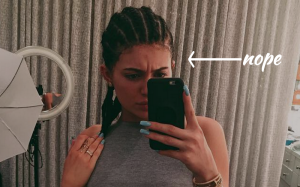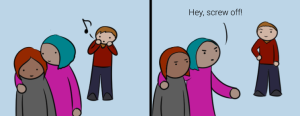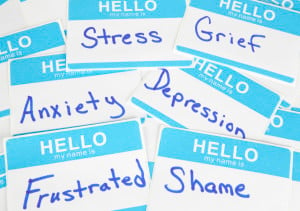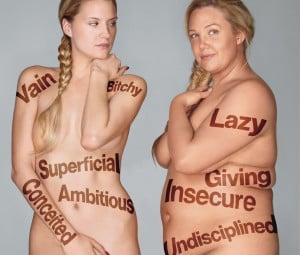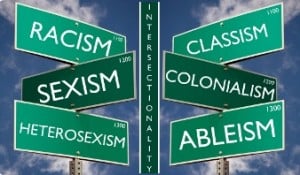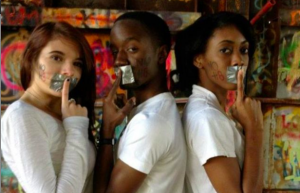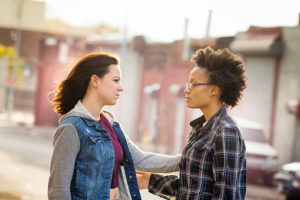Originally published on Role Reboot and cross-posted here with their permission.
(Trigger Warning: Sexual violence, murder, violence)
Anyone who thinks that rape jokes do not increase tolerance for rape, create a hostile educational environment for women on campuses, and negatively impact their ability to move freely is deluding themselves.
In October 2014, two lawsuits were filed against Phi Kappa Tau fraternity at Georgia Tech. The fraternity made national news in 2013 after the release of an ugly email in which the social chair of the fraternity gave members “luring rape bait” instructions for attending, of all things, a Take Back the Night event.
The communications essentially instructed boys to target girls and ply them with alcohol so that they could rape them. The fraternity was suspended for three years after the email came to light. The suits allege that the fraternity’s misogynistic culture contributed to a climate of harm and was a factor in at least two rapes.
The reports made by mainstream publications include family-friendly mention of “crass language” used by the boys. Like this lighthearted ditty:
Who can take a bike
Tear off the seat
Impale a virgin on it
And push it down the street
The S&M man
Who can take a tight slut
Fuck her til she cries
Then pull it out real fast
And skeet into her eyes
Another one, reserved for the frat’s 2012 Christmas party read:
We put her in a wooden box
She died from sucking Phi Tau cocks
We dig her out every now and then
She fucked us once, she’ll fuck us again
These lyrics are among the more mild parts of the song. These are violent depictions of abuse sung by boys from “nice families.” Boys that grow up next door, play sports with your kids, are your kids.
This isn’t “crass language,” it’s denigrating “humor” at best and hate speech at worst.
In either case, there are social costs we don’t care to recognize because to do so would be revelatory and so fundamentally disruptive. So instead people scratch their heads and wonder, “What’s wrong with these particular boys?”
The frat’s response to the lawsuits’ inclusion of these songs in complaints? They believe that lawyers for the reported rape victims “are exploiting the hypersensitivity of today’s college environments toward sexual assault.” In layperson’s speak: crazy, humorless, feminist bitches are whining too much, ruining boys’ fun, and suppressing their free speech.
Oh, also, probably destroying their lives and reputations, because Duke.
As great as it would be to isolate this and say, “WTF is wrong with these boys at this school?” it’s not possible. And what’s the point of doing it?
Here are 15 more examples illustrating the connections between sexual objectification, denigrating humor, male sexual entitlement, and rape attitudes at schools:
1. Earlier this year, American University opened an investigation into one of its fraternities, Alpha Tau Omega, after a series of emails was released. Among the several problematic messages were those suggesting ways to make sure girls are “fucked up” and moved to apartments so they “meet brothers they know less and would hook up with easier” and that in response to a girl’s claims of having been assaulted, “someone needs to stuff a d*** in that [redacted] girl’s mouth with the quickness.”
2. The Tau Kappa Epsilon fraternity at the University of Wisconsin at Milwaukee’s is being investigated after four people were roofied at a party in which the doorman marked girls with a color-coded “x” on their hands as they entered.
3. A young man wrote this email at William and Mary: “There’s beer to be drunk, porn to view, and sluts to fuck. Let me reiterate that last point: sluts are everywhere… That vagina needs you. Never mind the extremities that surround it, the 99% of horrendously illogical bullshit that makes up the modern woman, consider only the 1%, the snatch.” He didn’t stop there because apparently that wasn’t clear enough. “See some riding boots? Some uggs? A hideous pair of rain boots without a cloud in sight? Now, raise your gaze from the footwear up, allow your eyes to wander from the feet up the long and slender legs of the lesser sex until finally you arrive at God’s greatest gift: the box.” This puerile drivel was titled “Life, love and pussy.” After this email, framed as a “Save the Sluts” community service project, was leaked, the fraternity that he belonged to issued an apology and outlined disciplinary actions.
4. At Miami University of Ohio, someone thought it was a good idea to hang a poster titled “Top Ten Ways to Get Away with Rape,” which closed with, “If your [sic] afraid the girl might identify, you slit her throat.”
5. This is not limited to the United States: The rugby club at England’s Durham University was reprimanded last fall for playing an “It’s not rape if…” drinking game on campus. They’d already been prohibited from playing competitively after members dressed up like Jimmy Savile, a popular media figure who molested more than 1,000 victims.
6. At St Mary’s University in Canada, more than 80 students sang “Y is for ‘Your sister,’ O is for ‘Oh so tight,’ U is for ‘Underage,’ N is for ‘No consent,’ G is for ‘Grab that ass,’” during an orientation event.
7. At Wales’ Cardiff Metropolitan University a poster for orientation week events featured a man wearing a T-shirt emblazoned with the text: “I was raping a woman last night and she cried.”
8. Two high school students started wearing a T-shirt featuring a “giant photo of a buxom, topless young woman in heels, fishnets, and thong. The woman’s eyes were covered by a sign that read “hoes” and her body was plastered with the slogan: “WE ENJOY THEM BUT WE NEVER LOVE THEM.” The school dress code strictly monitored girl student’s dress, but this was an issue of “free speech.”
9. Boys at a New York high school this September thought it was a riot to tweet a photo of themselves in T-shirts that spell out RAPE as a person lay on the ground in front of them, mouth and hands bound with duct-tape.
10. Who can forget the infamous Steubenville video featuring boys joking about vaginally raping, anally raping, rating girls, and “dead” girls?
11. A University of Vermont fraternity surveyed members with this question: “If you could rape someone, who would it be?”
12. At USC, boys released a Gullet Report (“gullet” defined as “a target’s throat capacity and it’s [sic] ability to gobble cock. If a target is known to have a good gullet, it can deep-throat dick extremely well.”) For good measure, they added some overtly racist material as well.
13. A woman filed a lawsuit against Wesleyan University citing a fraternity known on campus as the “rape factory.”
14. A Yale fraternity took photos of members holding up signs reading, “We love Yale sluts.” Another fraternity had fun running around campus singing, “No means yes! Yes means anal!”
15. At Amherst, a fraternity had T-shirts made depicting a woman wearing only a bra and a thong. She was bruised and had an apple stuffed into her mouth, bound to a split and being roasted over a fire. The caption read, “Roasting Fat Ones Since 1847.”
Anyone who thinks that emails, jokes, T-shirts, and photographs like these do not increase tolerance for rape, create a hostile educational environment for girls and women on campuses, and negatively impact their ability to move freely and attend to their studies is deluding themselves with malice, because the evidence is quite clear.
These words and media reinforce a dangerous dominant heterosexuality and normalize sexism and violence against women.
I have written about some of these before and I add to and share this list often because I keep hearing people express surprise.
Please stop being surprised. We’re raising kids who think treating women this way is a joke or a minor inconvenience.
So many young men are arriving at schools thinking that they can discuss women’s “rape potential” with impunity for a reason. They know that in wink-wink fashion rape banter and worse, doing things like posting rape videos online, are ways to gain male status.
Most adults, frequently happy to engage in casual slut-shaming of young girls, still seem to think of rape in terms of theft, a form of property crime, instead of understanding it as the human rights violation that it is.
The notion that rape is a violation and a serious crime for which rapists can be held responsible seems not to have entered students’ heads.
Because adults are failing to talk to them. Not about consent, privacy, sexual entitlement, or what constitutes rape. While people profess to be worried about their kids being assaulted or falsely accused, 73% of parents with children under the age of 18 never talk to them about sexual assault or domestic violence.
In the United Kingdom, the toxic and sexist expression that permeates schools is euphemistically called “lad culture.” What do we call ours? I’d suggest “Boy Crisis,” but that’s already taken and people are super busy trying to make sure that we create elementary schools that “let boys be boys” so that our pronounced gender gap in self-regulation is maintained instead of eliminated.
These incidents take place in environments where rape is happening and institutions are struggling with understanding their responsibilities to victims, most of whom remain girls. According to a study released last year, one in 10 people between the ages of 14-21 have already committed an act of sexual violence. Boys are more likely to have been perpetrators, although the older girls get, the more likely they are to become perpetrators too.
However, 80% of victims in the study were girls—18% were boys and 5% were transgender youth. The teenagers with the highest propensity to sexually assault a peer were white kids from higher-income families with higher than average porn consumption. Between 20-25% of women and 3% of men will experience an attempted or completed sexual assault in college.
There are currently more than 85 colleges and universities being investigated for botching how they handle sexual assault.
By the time kids get to college, however, it’s too late. By then, we are faced with schools that are concerned with liability, not communities that understand responsibility.
Schools are on the record arguing that they are not responsible for protecting students. Not only are they not responsible, but schools are expunging rapists’ records so that they have better chances of getting into other schools once they are forced to leave a campus.
Ideas reflected in these examples also endanger boys and men by perpetuating the idea that only girls and women can be sexual assault victims. They also perpetuate myths about male power, masculinity, dominance, and the need for boys to be emotionless and without empathy to be considered “real” men.
There are ways for boys to express their masculinity, create fraternal bonds, and explore their sexuality that do not turn girls and women into “boxes,” “gullets,” “snatches,” “pussies,” “asses,” and “sluts” to be raped and physically abused for fun.
It is possible to cultivate a healthy sense of fraternity without the denigration and victimization of girls and queer youth—but that’s not what’s happening in too many places.
Sexual assault is correlated with status. Human societies where women enjoy higher status are not rape-prone like ours. If we want campuses to be safe places for everyone, we have to teach little boys and girls that women—as a class of human beings—are worthy, not of protection, but of rights, respect and authority, something that is not happening now.
While we have the formal recognition of these ideas, we don’t have a culture committed to them.
There are many initiatives to change campus culture. Some are based on consent, others on sex ed, and others on forcing schools to fulfill their obligations to all students equally. There is a thriving Know Your IX national movement and President Obama has announced the creation of a task force to help universities develop best practices for dealing with sexual assault on college campuses.
However, if one thing is certain, it is that our “teachable moments” have to happen way before people get to college.
[do_widget id=”text-101″]
Soraya L. Chemaly writes about gender, feminism and culture for several online media including Role Reboot, The Huffington Post, Fem2.0, RHReality Check, BitchFlicks, and Alternet among others. She is particularly interested in how systems of bias and oppression are transmitted to children through entertainment, media and religious cultures. She holds a History degree from Georgetown University, where she founded that school’s first feminist undergraduate journal, and studied post-grad at Radcliffe College. Please follow her on Twitter at @schemaly.
Portions of this article were adapted from an earlier article that ran in Salon.
Search our 3000+ articles!
Read our articles about:
Our online racial justice training
Used by hundreds of universities, non-profits, and businesses.
Click to learn more






